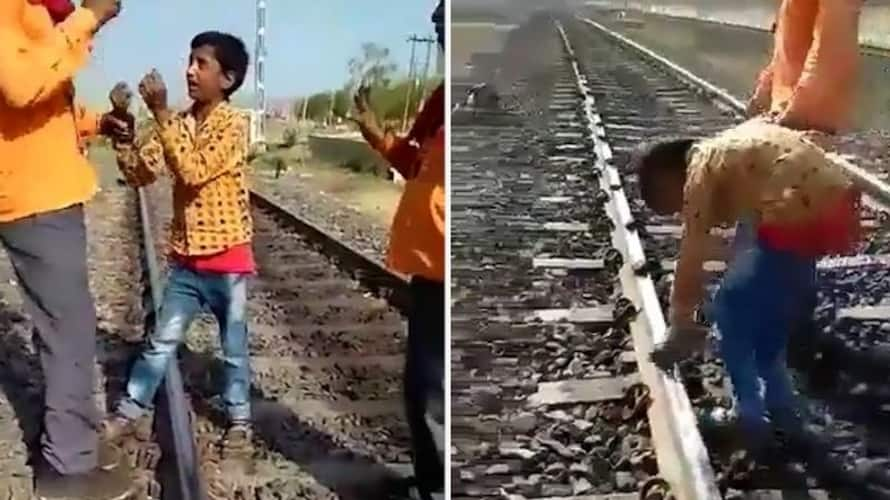The latest Kanpur train sabotage attempt, where a gas cylinder was placed on a railway track, unveils a grim narrative of how far certain forces are willing to go to destabilize India. These forces, unable to challenge the democratically elected BJP-led NDA government through legitimate means, have resorted to creating human-made tragedies to stir unrest in the country. This deliberate sabotage should not be seen in isolation; it is part of a larger pattern of organized attempts to derail trains and cause havoc, endangering countless lives in the process. Such actions are not only a reflection of frustration but also a disturbing indicator of the lengths to which the opposition and its supporters are willing to go to achieve their objectives. The Kanpur incident is just one of many such attempts to derail trains in recent years. There have been several instances where miscreants were caught placing granite pieces and other objects on railway tracks, attempting to force trains off the rails and cause accidents. Videos of these acts have surfaced, showing youngsters being manipulated to engage in these dangerous activities. These incidents are not random acts of vandalism; they are part of a calculated strategy orchestrated by those who wish to see chaos and instability in India. These attempts have resulted in significant loss of life and property, revealing the ugly face of political machinations that have no regard for human life. The idea of a ‘toolkit’ has become synonymous with a strategic blueprint for creating unrest in India. The Opposition, led by the Congress and its allies under the Indian National Democratic Inclusive Alliance (INDIA) bloc, appears to be exploiting this toolkit to its advantage. The frustration among these opposition parties is evident, as they have repeatedly failed to gain political traction against the BJP-led government. The Congress, under the leadership of Rahul Gandhi, has often sought the support of foreign NGOs and entities hostile to India’s progress. His repeated trips to the US and Europe, where he criticizes India’s economic growth with bizarre and unfounded narratives, further underline this strategy. His claim that China is growing faster than India is nothing short of a subject of ridicule. Even on issues like Indian farm policies or unemployment, a comparison with China reveals that India is far ahead and better placed when facts are properly examined. It seems that certain sections of the Opposition are willing to destabilize the nation for a few dollars, even if it means orchestrating tragedies that claim the lives of their own countrymen.

The Modi government, during its second tenure, has been credited with taking tough actions against corruption and misgovernance. It has not hesitated to push back against corrupt leaders, including members of the Gandhi family, holding them accountable for their actions. The government’s strong stance has led to a significant decline in the influence of the Congress party, nearly achieving a ‘Congress-mukt Bharat’—a country free from Congress dominance. However, the Modi administration’s decision to allow the Opposition parties to ‘gang up’ has given them the space to regroup and counter the government, often with misleading narratives and manipulative tactics. The BJP’s complacency, despite coining slogans like “Ab Ki Baar, Char Sau Paar” (This Time, 400 Plus Seats), and some irresponsible comments about rewriting the Constitution and abolishing reservations, have backfired. The party’s failure to secure a simple majority in its third term has emboldened the Opposition to intensify their toolkit activities. This is evident in their attempts to exploit the situation by creating human tragedies and then using these incidents to put pressure on the government. The Opposition’s tactics have become more desperate and dangerous. The use of train accidents as a tool to create panic and chaos is not only inhumane but also reveals the extent of their willingness to compromise national security for political gains. Organized agitations, like those against the farm laws or the Citizenship Amendment Act (CAA), have lost their potency; hence, the opposition seems to have shifted to more drastic measures. By causing large-scale accidents and human tragedies, they hope to create pressure on the government, especially in a coalition scenario, to yield to their demands or face the consequences of political instability. The emerging pattern of sabotage and the strategic use of human tragedies as political tools demand a strong response from both the government and the citizens. The government must enhance security measures, particularly around critical infrastructure, and ensure swift and stringent action against those found guilty of such heinous acts. Moreover, citizens need to be vigilant and discerning about the narratives being peddled in the name of opposition politics. India’s growth story should not be derailed by the nefarious designs of those who prioritize personal or political gains over the nation’s well-being. As India stands at the crossroads of progress and chaos, it is crucial to recognize the destructive ‘toolkit’ for what it is: a desperate attempt by certain forces to derail a democratically elected government and hinder the nation’s development. Only through unity, awareness, and decisive action can India overcome these challenges and continue on its path to prosperity and stability.





